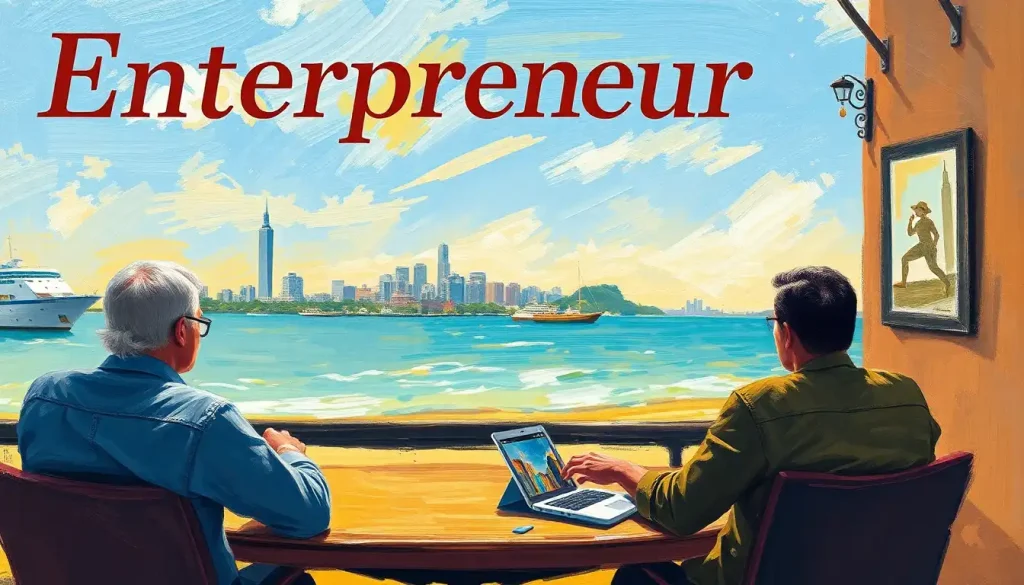As the embers of a once-promising startup smolder, a phoenix of wisdom and resilience rises from the ashes, ready to ignite future success. The journey of entrepreneurship is rarely a straight path to triumph; it’s often a winding road filled with unexpected twists, turns, and yes, even dead ends. But here’s the thing: those dead ends? They’re not the end of the story. They’re just the beginning of a new chapter.
Let’s face it, the term “failed entrepreneur” sounds pretty harsh, doesn’t it? It’s like slapping a big, red “LOSER” stamp on someone’s forehead. But here’s a little secret: failure is as much a part of the entrepreneurial journey as success. In fact, it might just be the most important part.
The Reality Check: Entrepreneurship Isn’t All Unicorns and Rainbows
Before we dive deeper, let’s get real for a second. The startup world isn’t all ping-pong tables, bean bag chairs, and overnight millionaires. It’s tough out there, folks. According to a study by Startup Genome, a whopping 90% of startups fail. Yep, you read that right. Nine out of ten. Those aren’t exactly Vegas odds, are they?
But here’s where it gets interesting. Those who’ve been through the entrepreneurial wringer and come out the other side? They’re not failures. They’re survivors. They’re the ones who’ve looked failure in the eye and said, “Nice try, buddy, but I’m not done yet.” These are the persistent entrepreneurs: turning setbacks into stepping stones for success.
So, why do so many startups crash and burn? Well, buckle up, because we’re about to take a bumpy ride through the graveyard of entrepreneurial dreams.
The “Oops” Moment: Why Startups Fail
Ever tried to sell ice to Eskimos? No? Well, that’s basically what some startups do when they create a product nobody wants. It’s like throwing a party and forgetting to invite the guests. Lack of market need is the number one reason startups fail. It’s not enough to have a cool idea; you need to solve a real problem that people are willing to pay for.
Then there’s the money issue. Running out of cash is like running out of fuel mid-flight. You might have the best idea since sliced bread, but if you can’t keep the lights on, you’re toast. And let’s not forget about the team. Having the right people on board is crucial. It’s like trying to win a basketball game with a team of sumo wrestlers – it just doesn’t work.
Sometimes, the competition just eats you for breakfast. Other times, you price yourself out of the market or into bankruptcy. And occasionally, let’s be honest, the product just sucks. It happens to the best of us.
But here’s the kicker: each of these failures is a goldmine of lessons. It’s like getting a MBA from the School of Hard Knocks. And trust me, that’s a degree that’s worth its weight in gold.
The Emotional Rollercoaster: When Your Baby (Startup) Dies
Now, let’s talk about the elephant in the room – the emotional impact of failure. It’s not pretty, folks. Imagine pouring your heart, soul, and life savings into something, only to watch it crumble. It’s like watching your house burn down while you’re still inside.
The disappointment can be crushing. Self-doubt creeps in like a thief in the night, stealing your confidence and leaving you questioning every decision you’ve ever made. “Am I really cut out for this?” “Was I just kidding myself?” These thoughts can be relentless, gnawing at your psyche like hungry termites.
And then there’s the stigma. In some cultures, failure is seen as a badge of honor, a rite of passage. In others, it’s treated like a communicable disease. People start avoiding you at parties, whispering behind your back. “Did you hear about John? His startup tanked. Poor guy.”
But here’s the thing: your worth isn’t determined by your net worth. Your value as a person doesn’t depreciate just because your business did. It’s crucial to maintain relationships and support systems during these tough times. Lean on your friends, family, and mentors. They’re your lifeline when you’re drowning in a sea of self-doubt.
And for the love of all that is holy, take care of your mental health. Meditation, exercise, therapy – whatever works for you. Your mind is your most valuable asset, so treat it like one. Remember, challenges of entrepreneurship: navigating the rocky road to business success is not just about business strategies, it’s also about personal resilience.
The Phoenix Rises: Learning from the Ashes
Alright, so your startup crashed and burned. Now what? Well, it’s time to put on your detective hat and conduct a thorough post-mortem analysis. Think of it as CSI: Startup Edition. What went wrong? Where did things start to unravel? Was it a sudden death or a slow, painful decline?
This isn’t about pointing fingers or playing the blame game. It’s about honest, sometimes brutal self-reflection. What were your strengths? Where did you fall short? Maybe you’re a visionary but struggle with the day-to-day operations. Or perhaps you’re a whiz with numbers but couldn’t sell water in a desert.
Understanding market dynamics and customer needs is crucial. Did you really know your target audience, or were you just guessing? Were you solving a real problem, or were you just in love with your own idea?
And let’s talk about money, honey. If financial management isn’t your strong suit, it’s time to brush up on those skills. You don’t need to become the next Warren Buffett, but you should at least know the difference between cash flow and revenue.
But perhaps the most important lesson of all is developing resilience and adaptability. The ability to get knocked down seven times and stand up eight – that’s what separates the wantrepreneur to entrepreneur: transforming your business dreams into reality.
Rising from the Ashes: The Comeback Kid
So, your first (or second, or third) startup didn’t work out. Big deal. You know who else failed? Steve Jobs. Walt Disney. Arianna Huffington. The list goes on. Failure isn’t the end; it’s just a pit stop on the road to success.
It’s time to redefine what success means to you. Maybe it’s not about becoming the next unicorn startup. Maybe it’s about building a sustainable business that allows you to live the life you want. Or maybe it’s about using your skills to make a positive impact on the world.
Your experiences, even the painful ones, are valuable. They’re your secret weapon, your competitive advantage. Use them. Leverage them for future opportunities. That investor who turned you down last time? Reach out to them. Show them how you’ve grown, what you’ve learned.
Networking becomes even more critical now. Attend events, join entrepreneur groups, reach out to old contacts. You’d be surprised how many people are willing to help someone who’s shown the courage to try, fail, and try again.
And hey, who says you have to stick to the same path? Maybe your next venture will be in a completely different industry. Or perhaps you’ll find success as a consultant, helping other startups avoid the pitfalls you encountered. The world is your oyster, my friend.
The Comeback Stories: From Zero to Hero
Need some inspiration? Let’s take a quick tour through the Hall of Fame of Failed Entrepreneurs Who Made It Big.
Remember Rovio, the company behind Angry Birds? Before they hit the jackpot with those furious fowls, they developed 51 unsuccessful games. Fifty-one! Most people would have thrown in the towel long before that.
Or how about James Dyson? He went through 5,126 failed prototypes before he finally cracked the code on his revolutionary vacuum cleaner. That’s some serious persistence right there.
And let’s not forget about Walt Disney. Before he created the happiest place on earth, he was fired from a newspaper for “lacking imagination and having no original ideas.” Oh, the irony!
What do these stories teach us? That failure is not the opposite of success; it’s a part of it. These entrepreneurs didn’t succeed despite their failures; they succeeded because of them. Each failure was a lesson, each setback a stepping stone.
The Final Word: Embrace the Journey
So, here’s the deal, aspiring entrepreneur. Failure isn’t something to be feared; it’s something to be embraced. It’s your teacher, your mentor, your tough-love coach pushing you to be better.
Perseverance isn’t just a nice-to-have quality for entrepreneurs; it’s a must-have. The road to success is long, winding, and often uphill. But guess what? The view from the top is worth it.
To all you aspiring entrepreneurs out there, to all you wannabe entrepreneurs: turning aspirations into successful business realities, I say this: Dream big. Take risks. Fall down. Get back up. Repeat.
Remember, entrepreneur failure: lessons, recovery, and success stories are not just cautionary tales; they’re roadmaps to success. They show us what’s possible when we refuse to give up.
And to those of you in the trenches right now, those of you licking your wounds from a recent failure, I want you to know this: You’re not alone. You’re not a failure. You’re a warrior in training, preparing for your next battle.
So, dust yourself off. Take those lessons you’ve learned and use them. Your next venture might just be the one that changes the world. Or at the very least, it might be the one that changes your world.
Because here’s the truth: In the grand story of entrepreneurship, failure isn’t the end. It’s just the end of the beginning. Your next chapter is waiting to be written. So pick up that pen (or laptop) and start writing. Your comeback story starts now.
And who knows? Maybe one day, your story will be the one inspiring the next generation of entrepreneurs. Because in the end, that’s what it’s all about – learning, growing, and passing on the wisdom we’ve gained along the way.
So here’s to you, failed entrepreneur. May your next venture be your best one yet. And even if it’s not, well, you know the drill by now. Dust off, stand up, and try again. After all, that’s what being an entrepreneur is all about.
References:
1. Startup Genome. (2019). Global Startup Ecosystem Report 2019. Retrieved from https://startupgenome.com/reports/global-startup-ecosystem-report-2019
2. Blank, S. (2013). Why the Lean Start-Up Changes Everything. Harvard Business Review. Retrieved from https://hbr.org/2013/05/why-the-lean-start-up-changes-everything
3. Ries, E. (2011). The Lean Startup: How Today’s Entrepreneurs Use Continuous Innovation to Create Radically Successful Businesses. Crown Business.
4. Duckworth, A. (2016). Grit: The Power of Passion and Perseverance. Scribner.
5. Dweck, C. S. (2006). Mindset: The New Psychology of Success. Random House.
6. Osterwalder, A., & Pigneur, Y. (2010). Business Model Generation: A Handbook for Visionaries, Game Changers, and Challengers. John Wiley & Sons.
7. Sinek, S. (2009). Start with Why: How Great Leaders Inspire Everyone to Take Action. Portfolio.
8. Horowitz, B. (2014). The Hard Thing About Hard Things: Building a Business When There Are No Easy Answers. Harper Business.
9. Thiel, P., & Masters, B. (2014). Zero to One: Notes on Startups, or How to Build the Future. Crown Business.
10. Guillebeau, C. (2012). The $100 Startup: Reinvent the Way You Make a Living, Do What You Love, and Create a New Future. Crown Business.












Would you like to add any comments? (optional)